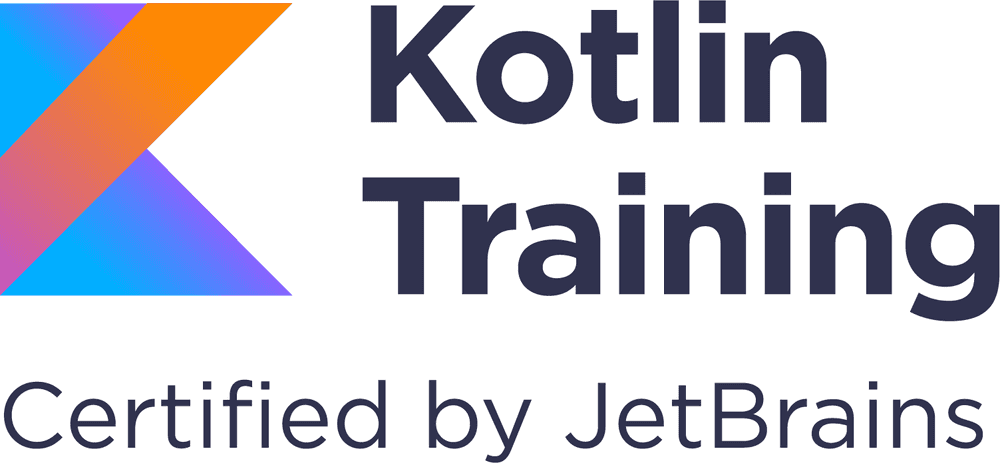Overview
This is an intensive Kotlin training course for developers moving to Kotlin from Java, C# or similar languages. It is designed to be conducted over four days but can be tailored based on the requirements of the delegates. The Kotlin delivery is workshop-based with delegates spending the majority of their time solving problems and creating sample applications.
By the end of the delivery, delegates will be able to program using all the features of Kotlin, refactor Kotlin codebases in IntelliJ, perform TDD using KotlinTest and generate mock objects using Mockito. Additionally, they will be able to develop microservices via both Spring MVC and WebFlux and create basic Android applications.

Outline
Introducing Kotlin on the JVM
- Four coding paradigms within Java 9
- Limits imposed by backwards compatability
- The new consensuses in language design
- A brief history of the Kotlin language
- Comparing Kotlin to Scala and Clojure
- Comparing Kotlin to Swift and TypeScript
First Steps with Kotlin
- Declarations and type inference
- The Kotlin type system and conversions
- Packages, access levels and default imports
- Nullable types and operators for null safety
- Keywords for selection and iteration
- Options for declaring basic functions
- Overloading, infix functions and ranges
Object Orientation
- Decompiling Kotlin classes using 'javap'
- Understanding properties and backing fields
- A detailed explanation of primary constructors
- Adding extra fields and secondary constructors
- Extra features automatically added to data classes
- Overriding, abstract classes and interfaces
- Using object expressions as event handlers
- Object declarations and companion objects
Agile Development
- Reviewing the core principles of Agile development
- Refactoring Kotlin code within IntelliJ
- Performing TDD in Kotlin using KotlinTest
- Using Mockito to separate types from dependencies
- Options for BDD and Property Based Testing
Generics and Type Parameters
- Revision of covariance and contravariance
- Common issues with bounded wildcards in Java
- How declaration site variance simplifies generics
- Support for use-site variance (aka type projection)
- Declaring single and multiple constraints on types
Working with Collections Part 1
- Introducing the Kotlin collections library
- Working with mutable and immutable collections
- Support for destructuring types and collections
Functional Programming
- Working with function references and code blocks
- Declaring functions as parameters and return types
- Using higher order functions for internal iteration
- Creating your own versions of 'filter', 'map' etc...
- Using higher order functions to prevent duplication
- Understanding partial invocation and currying
- Choosing between code blocks and local functions
- Common misunderstandings regarding enclosure
Working with Collections Part 2
- Basic coding using 'filter', 'map' and 'forEach'
- Testing against a predicate using 'all', 'any' etc...
- Why 'flatMap' is such as valuable operation in FP
- Distinguishing between 'fold', 'foldRight' and 'reduce'
- Converting between collection types within FP
Interoperability Between Kotlin and Java
- General guidelines for mixed language codebases
- Considerations when calling Java libraries from Kotlin
- Obtaining and using java.lang.Class objects in Kotlin
- Tips and idioms for calling Kotlin libraries from Java code
Creating Spring Microservices in Kotlin
- Revision of the Spring Framework and RESTful architecture
- Creating Spring Boot projects in Kotlin via the Spring Initializr
- Declaring Spring MVC based RESTful services using annotations
- Injecting dependencies and configuring exception handling
- Creating reactive microservices using Spring WebFlux
- Taking advantage of the Kotlin specific routing DSL
Creating Mobile Applications in Kotlin
- Revision of the Android platform and Dalvik VM
- Installing Android Studio and configuring emulators
- Introducing the sample project for tracking expenses
- Reverse engineering the sample activities and layouts
- Performing dependency injection on Android with Dagger 2
- Persisting application state using the Realm database
Requirements
Delegates must be confident Java developers, or else have equivalent experience in languages like Groovy and Clojure. Knowledge of Functional Programming concepts is very helpful but not essential. If the chapters on Spring Services and Mobile Development are being covered, then delegates should have prior experience with those frameworks.